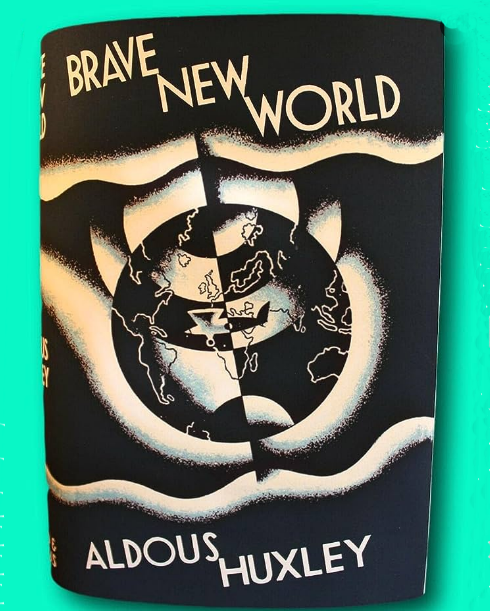|
After reading 1984, I was on a roll. I could dignify my sixteen-year-old rage in terms of something grander: human rights. My reading was now romantically framed and interpreted in terms of oppression, truth and the individual’s urge to freedom. In this case, the freedom to say “No.” In Huxley’s manufactured negative utopia, everything is available except depth and meaning. I readily equated this with my middle-class milieu’s aspiration to comfort and consumerism, as empty and soulless and superficial as you could get, to my mind. I wasn’t able to appreciate that my parents’ generation were survivors of a world war and had an understandable yearning for material well-being, stability and reassuring predictability.
In Huxley’s 1931 thought experiment, in a society beleaguered by the Great Depression, he was driven by the expansion of mass production and the scientific advances of the time to imagine extreme possibilities of social engineering and a widespread, willing acquiescence to them. For me, as for many, it was another potential totalitarian state controlling its citizens and I was able wave my inner flag of defiance and freedom. The idea of Helmholtz being exiled to an island not as punishment but as a reward, since the most interesting individuals are to be found there, had a correspondence with the notions we were brought up on of Heaven, where the good, saintly people go, and Hell, where all the badly behaved and fun ones will be. I find the novel curiously unsatisfying today, too conceptual for my liking and the characters difficult to relate to, John the Savage, strange in his violence. The idea of soma as a happiness drug with no side-effects is intuitively suspect. It’s just too easy. Every up must have its corresponding down: or else how would you recognize the up when you had it? When everything is provided, effortless and cost-free, none of it has any value. Under these conditions, we all become the poor little rich girl who languishes because nothing she does makes a difference. Like they say: the rich know the price of things, the poor know the value of them. At all events, one would expect an idealized society like this to collapse from its own internal listlessness. It would seem that we humans need opposition, the contrary, sacrifice and struggle in order to find out who we are and make the game worth the candle.
0 Comments
Leave a Reply. |
Blogging good books
Archives
July 2024
Categories |

 RSS Feed
RSS Feed
